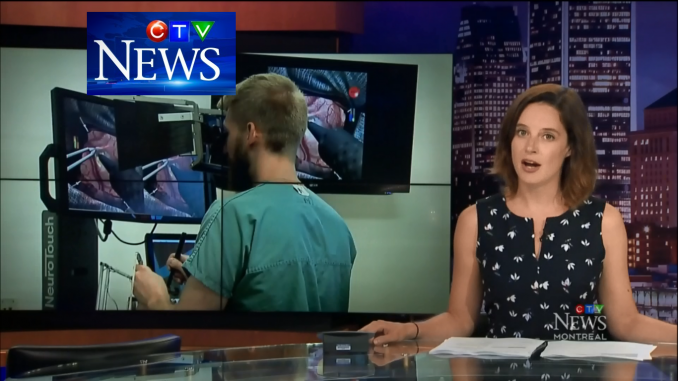
CTV Montreal staff
Published Saturday, August 10, 2019 4:49PM EDT Last Updated Saturday, August 10, 2019 6:39PM EDT
While flight simulators have long been used to help pilots hone their skills, researchers at the Montreal Neurological Institute have found another use.
In a study published in The Journal of The American Medical Association, the researchers outlined how they’ve been using the technology, enhanced with artificial intelligence, to help surgeons practice their craft.
“We actually took tumours out and measured their density and then put all that information into the simulator,” said study co-lead author Rolando Del Maestro. “Then we took colour and put that into the simulator, the way the blood vessels bleed.” PHOTOS Brain surgery A study out of the Montreal Neurological Institute examined the effectiveness of training young brain surgeons with flight simulator technology.
In one simulation, a brain is virtually constructed, pulsating like the real thing. The realism is a key component for training new surgeons, who during their six years of training have always had a teaching physician by their side while working with real patients.
“An individual who has never been involved in doing an operation on the brain before is suddenly facing with doing an operation on the brain,” said Del Maestro.
“The difficulty with that is how do you expose a trainee to a situation where they would be operating in a real environment in a time when you’re very close to a critical structure and therefore the consequences to the patient are very severe?” said co-lead author Alexander Winkler-Schwartz.
For the study, the researcher looked at 50 participants with different levels of medical training, each of whom performed five complex tumour resections using the simulator. The simulator tracked their movements and ranked their level of expertise.
“This algorithm was able to categorize people 90 per cent of the time using only six different operative factors that involve movements and using both hands and the forces of each instrument,” said Winkler-Schwartz.
“Our experiments have shown that with the virtual reality there really are two things that are critical,” added Del Maestro. “Expert neurosurgeons are safe, the second thing that seems to be a focus is efficiency.”
